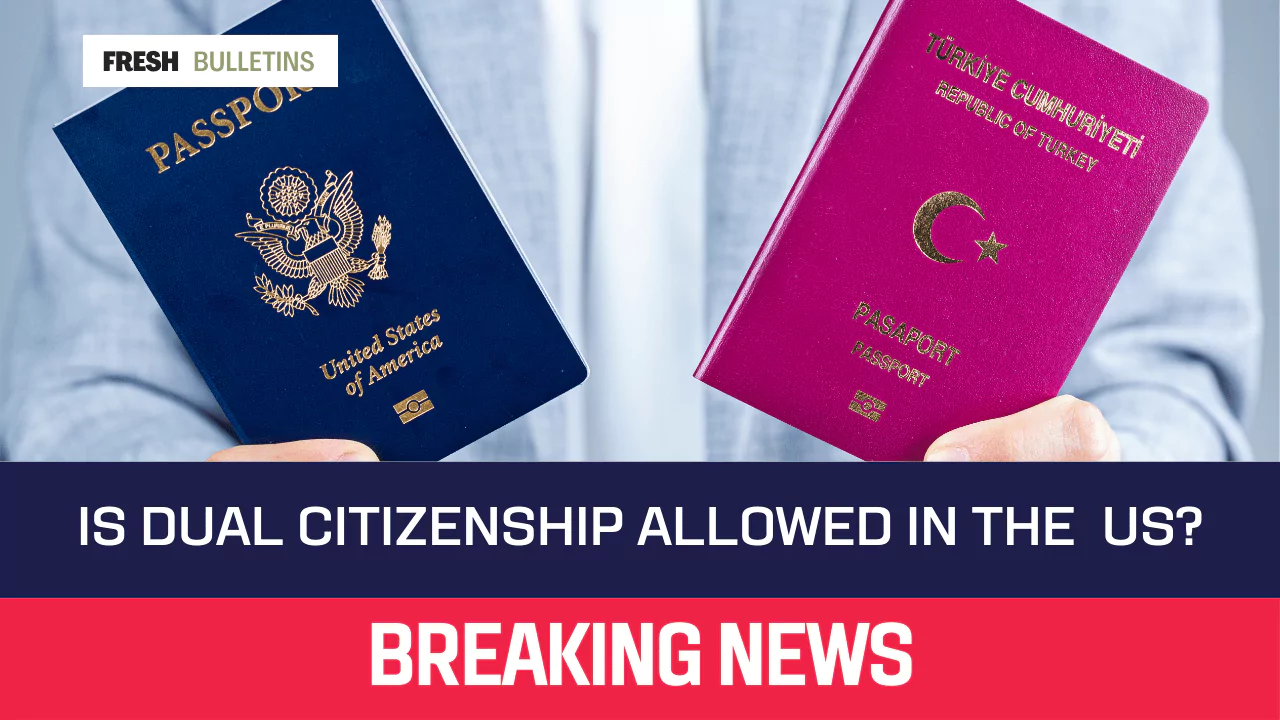Is Dual Citizenship Allowed in the US? (Answered)
Yes, Dual citizenship is indeed allowed in the United States. In fact, the US allows its citizens to hold dual citizenship or citizenship in multiple countries, as long as they meet the eligibility requirements of each country’s nationality laws.
The US does not require individuals to relinquish their citizenship when obtaining citizenship in another country, and the country’s laws allow for dual citizenship.
Keep reading to find out more!
Understanding Dual Citizenship
Dual citizenship means a person is a national of two countries at the same time. It comes with rights and responsibilities in both places.
Definition and Explanation
Dual citizenship means you are a citizen of two countries at the same time. This can happen if you were born in one country and then became a citizen of another through naturalization.
For example, if a child is born in the U.S. to parents from another country, that child might automatically be a U.S. citizen and also a citizen of the parents’ home country unless their parents are diplomats.
People with dual nationality enjoy rights and privileges in both countries where they hold citizenship. These rights might include voting, working without needing special permission, owning property, and more benefits depending on each country’s laws.
Holding passports from two different countries allows individuals to travel more easily between them or seek consular protection while abroad from both nations when needed.
Legal Aspects
U.S. citizens can obtain citizenship in another country. This does not affect their U.S. citizenship. However, the rules can vary. Some countries allow this. Others may require people to give up their U.S. citizenship.
It’s essential to know the laws of both countries.
Eligibility for dual citizenship depends on different factors. Each nation has its own rules about citizenship. United States citizens must follow U.S. laws. Citizens may need to fill out special forms, like Form N-400.
They should be aware of tax laws, too. Taxes may be owed in both countries. Understanding these legal aspects is crucial for anyone considering dual citizenship in the U.S.
Understanding the laws of both countries helps to avoid surprises.
Is Dual Citizenship Allowed in the U. S.?
Yes, it is. Citizens can have more than one nationality without losing their American citizenship. However, some rules apply.
Overview of U.S. Laws and Regulations
U.S. laws allow dual citizenship. This means a person can be a citizen of the United States and a citizen of another country. However, dual citizens must use a U.S. passport to enter and leave the U.S. It is important for U.S. citizens to check if the other country allows dual citizenship.
Some countries do not.
U.S. Citizenship and Immigration Services (USCIS) states that a person can become a U.S. citizen through naturalization. This process has specific requirements. Naturalized U.S. citizens can enjoy the same rights as those born in the country.
They can vote, hold office, and travel with a U.S. passport.
How to Obtain Dual Citizenship in the U. S.?
To get dual citizenship in the U.S., you must meet certain requirements. This process includes filling out forms and gathering documents like a birth certificate or marriage certificate.
Eligibility and Requirements
To obtain dual citizenship in the U.S., one must meet certain eligibility requirements. These requirements ensure that individuals can apply for citizenship legally.
- Permanent Residency: You must live in the U.S. as a permanent resident with a green card for five years. If you are married to a U.S. citizen, this period is shortened to three years.
- Age Requirement: Applicants need to be at least 18 years old when filing for citizenship. This is crucial for understanding rights and responsibilities.
- Basic English Skills: Knowledge of basic English is important. Applicants should understand reading, writing, and speaking at a simple level.
- Form I-485: Complete Form I-485 to register your permanent residence or adjust your status. This form is a key part of applying for naturalization.
- Good Moral Character: You must show good moral character during your residency period, which means being honest and following U.S. laws.
- Civic Knowledge: Knowledge of U.S. history and government is required too. You’ll need to answer questions about these topics during the interview process.
- Considerations for Children: Children born in the U.S. to non-U.S. citizen parents may have different paths to citizenship, depending on their parents’ status.
- No Prior Felonies: Avoid serious legal issues like felonies or bad conduct that can affect your application negatively.
These steps help pave the way to dual citizenship in the United States and ensure applicants meet all necessary criteria.
Application Process
The application process for dual citizenship in the U.S. can be complex. It is important to follow each step carefully.
- Fill Out Form N-400
This is the Application for Naturalization. You must complete it to apply for citizenship. - Prepare Your Documents
Gather all necessary documents. This includes your green card, photos, and any supporting evidence. - Pay the Fees
Submit the required application fees. Fees may vary based on your situation, set by the U.S. Department of Homeland Security. - Schedule Your Biometrics Appointment
After you submit your application, you will get a notice for this appointment. You will provide fingerprints and photographs for background checks. - Attend Your Citizenship Interview
This usually happens a few months after your biometrics appointment. An officer will ask about your application and your knowledge of U.S. history and government. - Take the Oath of Allegiance
If approved, you will attend a ceremony to take an oath. This makes you a citizen of the United States. - Get Your Citizenship Certificate
After taking the oath, you receive a certificate. This proves your new status as a citizen. - Consider Legal Help
Most applicants need help from an immigration lawyer during this process. They can guide you through paying fees and filing forms correctly. - *Special Cases for Children Born in the U.S.
Children born in America to non-U.S.-citizen parents may have different paths to dual citizenship or need additional steps.
This process is key for those seeking dual citizenship in the USA or planning to retain their Filipino citizenship or other nationalities.
Considerations for Children Born in the U.S. to Non-U.S. Citizen Parents
A child born in the U.S. to non-U.S. citizen parents may automatically become a U.S. citizen. This rule exists unless the parents are foreign diplomats. For these children, U.S. birthright citizenship allows them to claim dual citizenship if their parents are citizens of another country.
Children in this situation should check the laws of their parent’s home country. Some nations allow dual citizenship, while others may not. Understanding these rules is key for families.
They can also seek guidance from United States Citizenship and Immigration Services for help with citizenship matters.
Advantages of Dual Citizenship
Dual citizenship offers many benefits. You can enjoy rights in two countries, like voting and traveling easily.
Political Rights
Dual citizens can vote in both countries. This gives them a say in political matters. They can help choose leaders and laws. Being able to vote in different countries adds more power.
Dual citizenship allows citizens of the Philippines to join political life in the U.S. and the Philippines. They can represent their views and concerns. This right is important for all dual nationals.
They play a key role in shaping their communities and countries.
Work and Travel
Dual citizens enjoy great benefits for work and travel. They can move freely between countries. No visa is needed for a visit. They can work in both the U.S. and another country without a work permit.
This makes life easier for those with Canadian citizenship or other multiple citizenships.
Traveling is also simpler. Dual citizens must enter the U.S. using a U.S. passport. This rule ensures they are recognized as U.S. nationals. They can carry two passports, which offers more options when traveling.
Social Services
Dual citizens can use social services in both countries. This includes education and healthcare. For example, a natural-born Filipino with U.S. citizenship can access schools and medical care in the U.S. They can also benefit from similar services in the Philippines.
This access helps families get the support they need. It also gives children a chance to learn and grow in multiple cultures. Dual citizenship allows people to enjoy the best of both worlds.
Two Passports
Having two passports can make travel much easier. You can use a U.S. passport for trips to and from the U.S. This is important because many countries require a passport to enter. However, you can also hold a passport from another country.
For example, a naturalized citizen might keep their original passport. This allows for smoother entry into that country.
Two passports give you more options. With a Canadian passport, you can travel freely in Canada. You have the right to live and work in both countries. The perks include access to social services and educational opportunities.
Having citizenship in two nations can be very beneficial.
Property Ownership
Dual citizenship allows people to own property in both countries. Many nations have rules that limit property ownership to their citizens. In the U.S., dual nationals can buy and own land without extra restrictions.
This is a big benefit for those holding both U.S. and another nationality, like natural-born Filipinos or Canadian citizens.
Owning property can lead to financial advantages. For example, it may offer a safe place to live or work. Dual citizens can enjoy these perks while keeping ties to their home country.
This flexibility can be especially helpful for people managing properties in both nations.
Cultural Education
Cultural education is a key benefit of dual citizenship. Individuals can learn about the history and languages of both countries. They experience the traditions and lifestyles of each nation.
This rich blend helps them appreciate diversity.
For example, a person with U.S. and Indian citizenship can understand both cultures deeply. They may celebrate American holidays and Indian festivals. This connection enhances their knowledge and broadens their worldview.
It also fosters a sense of belonging in two different places.
Disadvantages of Dual Citizenship
Dual citizenship brings some challenges. You have duties in both countries. This can mean paying taxes to both places. Some jobs may not let you work if you hold dual nationality. The process of keeping your status can be tricky, too.
Many people find this hard to handle. Want to know more about the downsides?
Dual Obligations
Having dual citizenship means following the laws of two countries. This can lead to dual obligations. A citizen must obey the rules in both nations. This includes paying taxes and serving in the military if needed.
U.S. citizens cannot serve in a foreign military that is against the U.S. Doing so can risk losing American citizenship. Dual nationals must be careful. They need to understand the laws and duties of both countries.
Conflicts can arise, making it hard to fulfill each obligation.
Double Taxation
Dual citizenship can lead to double taxation. This means you may owe taxes in both countries. The U.S. taxes its citizens on their worldwide income. This applies even if you live abroad.
For 2024, U.S. citizens can exclude up to $126,500 of foreign income. Married couples filing jointly can exclude up to $253,000. Income tax treaties help reduce or eliminate this extra tax burden.
For example, the U.S. has a treaty with New Zealand. This agreement can lower the chance of paying taxes in both countries.
Barriers to Some Forms of Employment
Having dual citizenship can lead to job barriers. Some jobs, especially those needing security clearances from the U.S. government, may reject dual nationals. Employers often check citizenship status closely.
They may worry about divided loyalties or obligations to another country. It can limit the options for those seeking certain government roles or high-security positions.
Naturalized citizens or green card holders might face these challenges. The rules can vary depending on the job and its requirements. This can make finding a suitable position harder for some people.
A Complicated Process
Obtaining dual citizenship can be a hard task. It often costs a lot of money and takes a long time. Many people feel lost in the rules and laws. Each country has its citizenship laws.
For U.S. citizens, the process may involve forms, interviews, and waiting. Consulting qualified experts can help. They understand the rules for employment and finances. This advice is important for those from other countries, like British or Chinese citizens.
Dual citizenship carries responsibilities such as taxes and jury duty. For instance, you may need to file tax returns in both countries. These factors make the process even more complicated.







